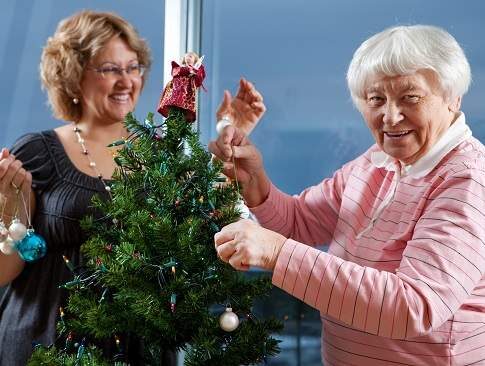How do adult children know when their elderly parent needs help?
Oftentimes the parent won’t be the one to admit they need assistance. And sometimes they may even try to hide the fact that they need additional care. We’ve put together some helpful tips on how you – the adult child – can recognize the signs that your aging parent needs help, as well as recommendations on what you can do next. So, while you’re visiting with loved ones this holiday season, keep the following in mind:
Their once tidy home is now being neglected
Does your parent seem to be having difficulty doing typical housekeeping tasks? Are you noticing more dirt and clutter around their home? Cleaning the house can become difficult for aging parents for a variety of reasons. Their eyesight could be failing, and they could be missing spots simply because they cannot see the dirt. They may have difficulty moving around or bending. These physical limitations could be preventing them from doing any cleaning around the house.
Recommendation: Non-medical home care services like Companion Care could offer support to your parent by providing light housekeeping and laundry services.
They are losing track of their medication…or skipping it altogether
As your parent ages, they tend to have more medications to take each day. It may become more difficult for them to remember what to take and when. You may find that your parent has been skipping doses as advised by their doctor, or that they are taking more per dose than stipulated in the prescription. Missing doses completely could affect their health; taking more medication than their doctor has prescribed could have catastrophic outcomes.
Recommendation: A pillbox that stores their daily doses of medicine is a great way to help your parent avoid skipping or taking too much of their prescribed medications. Organize a week’s worth of medication in advance, and place the pill box in a convenient location to help your parent keep up with their medications.
There’s a decline in their personal hygiene care
If you start to notice that your aging parent has unkempt hair, dirty or lengthy nails, poor oral hygiene, body or urine odor, or is wearing the same clothes over and over again, this might be a sign that they need help.
Recommendation: Caregivers can provide Personal Care services that aid and assist with bathing and hygiene needs specific to your parent.
Driving safely has become an issue
Check for dents or scratches on your parent’s vehicle. Additionally, if there is an increase in traffic violations, if your parent easily becomes lost in familiar areas, or you notice signs of deteriorating vision, this could mean that they need to hand over the keys. This can be a hard topic to address with your parent, but there are options.
Recommendation: If your parent is still active and social and enjoys getting out of the house, companion caregivers can safely provide transportation to the grocery store, doctor appointments, lunch out with friends and more.
How did you first recognize that your elderly parent needed some extra assistance? What were the first signs? Comment here or head to our Facebook page to join the conversation.
If you would like more tips like these, as well as information on family caregiving, home care, aging and more delivered right to your inbox, subscribe to our weekly newsletter.
